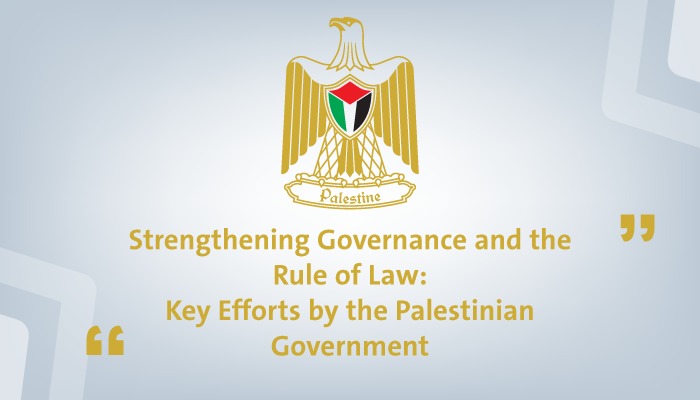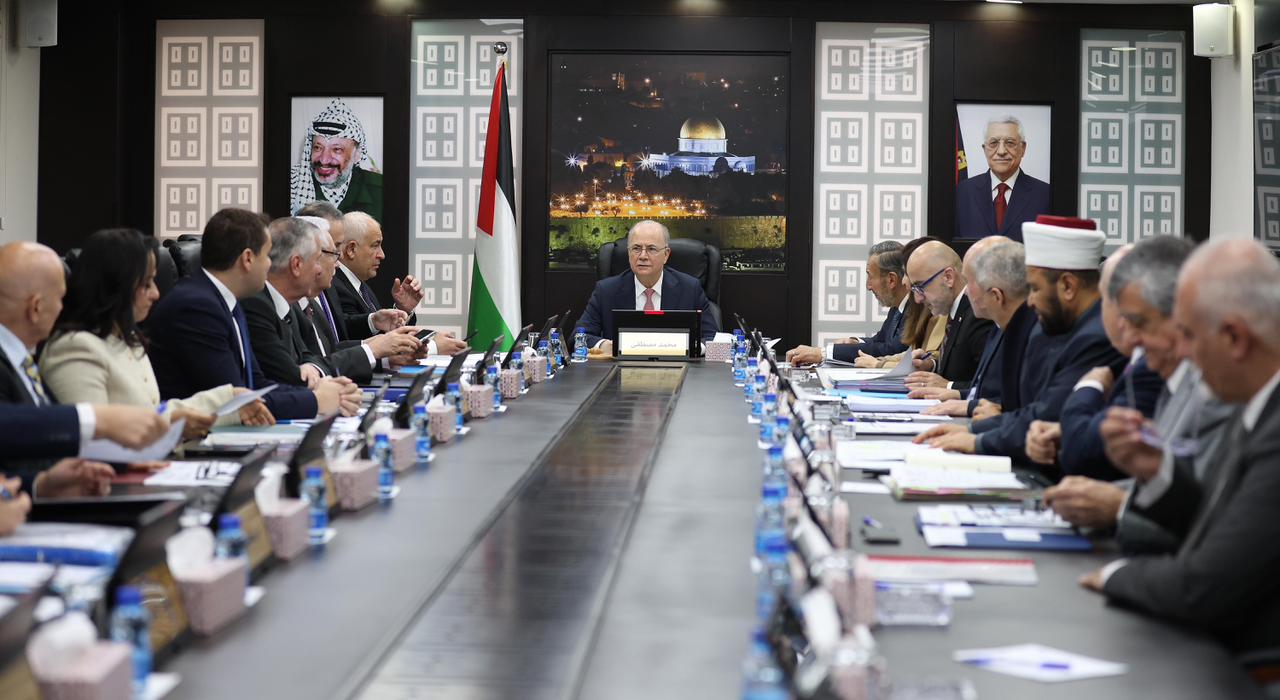RAMALLAH, November 25, 2025 (WAFA) – The Palestinian Government continues to implement wide-ranging reforms aimed at entrenching good governance and strengthening the rule of law, grounded in its conviction that judicial independence and the protection of rights and freedoms are essential to state-building and strengthening public trust in state institutions. The Government has approved the National Cross Sectoral Strategy to Strengthen Governance and Anti-Corruption 2025 – 2030.
According to a report issued by the Government Communication Center on Tuesday, the Government’s efforts to consolidate governance and the rule of law are advancing along multiple tracks:
First: Legal and Institutional Framework
In this area, the government has focused on rationalizing public expenditure, optimizing human resources, and improving transparency in service delivery.
The Government approved the Governance Framework for Non-Ministerial Public Institutions (2025–2026), under which nine entities were dissolved or merged, including:
▪︎ The Palestinian Agricultural Disaster Risk Reduction and Insurance Fund (PADRRIF)
▪︎ The Istiqlal Bank for Investment and Development
▪︎ The Palestinian National Disaster Risk Management Center (PALDRM)
▪︎ The Cooperative Work Agency
▪︎ The Palestinian National Institute of Public Health
▪︎ The Palestinian Land and Water Settlement Commission
▪︎ The Radiation and Nuclear Work Regulation Agency
▪︎ The Palestinian Cinema Agency
▪︎ The Palestine Center for Government Excellence
Additionally, the Palestinian International Cooperation Agency (PICA) and the Palestinian Council for Consumer Protection underwent restructuring with newly formed boards, while the Palestinian Agricultural Credit Institution was reorganized and its staff reduced by half. A new governance framework was also introduced for the Jordanian-Palestinian Agricultural Products Marketing Company, with an investment value of $18 million. The General Administration for Borders and Crossings was likewise transferred to the Ministry of Interior with an independent budget.
In the services sector, the Council of Ministers approved the Hajj Governance Plan to unify the Hajj pilgrim draw of lots selection procedures (Qurrah), regulate fees, and enhance service delivery. A committee was formed in October 2025 to review arrangements for the 2026 Hajj season.
In the security sector, President Mahmoud Abbas issued decrees appointing new heads of the security services and ordering the early retirement of all officers at the rank of Brigadier General born before 1 May 1970, as part of a broader restructuring plan to improve performance and readiness. A presidential decree was also issued establishing a National Committee to draft the interim constitution governing the transition from authority to statehood.
While in its ongoing efforts to enhance transparency and ensure equal opportunities, the Government conducted—for the first time—a competitive, merit-based recruitment process for 12 Deputy Minister positions, with 132 candidates participating. The Council of Ministers also approved the executive plan for implementing the National Cross Sectoral Strategy to Strengthen. Governance and Anti-Corruption 2025 – 2030.
Second: Access to Justice
Government efforts in this area focus on strengthening justice institutions and enhancing their legislative and administrative tools to improve citizen access to judicial services.
The Government prepared a draft legal aid decree-law to support vulnerable groups unable to afford legal representation. The Ministry of Justice launched an online Legislation Platform to expand public consultation on draft legislations the Government seeks to issue, thereby opening the door for broader public participation. In addition, the Ministry introduced two digital systems—one for arbitrator accreditation and renewal, and another for applying for or renewing legal translator licenses. It also activated an e-payment system for criminal record certificates and authentication services.
The Ministry is also working on drafting new laws to enhance access to justice, including a draft decree-law on forensic medicine, an amended Arbitration Law, and a new Palestinian Penal Code, in addition to reforms aimed at expediting litigation and reducing case backlogs.
A total of 21 new judges have been appointed from among the graduates of the Palestinian Judicial Institute, while 32 trainees have been admitted to the second phase of the Judicial Training Institute to further reinforce the judiciary and the Public Prosecution with additional judges and prosecutors. Work is also underway to adopt a shift work system to ensure judges are available on duty outside official working hours, alongside the recruitment of new staff in the courts.
The Judicial Institute has launched new online training programs on court administration, and an electronic judicial notification system has been approved, enabling the rollout of SMS-based notification services. The Council of Ministers also endorsed a comprehensive assessment study of the judicial sector to improve performance in line with international standards.
Third: Democratic Practices and Freedom of Expression
The Government continues to advance protections for rights and freedoms enshrined in the Palestinian Basic Law and other applicable legislation.
It strengthened dialogue with Civil Society Organizations and engaged the various stakeholders on reforms, and the draft Local Council Elections Law was submitted to the President for promulgation.
Additionally, a review of the 2018 Cybercrime Law is underway to ensure alignment with constitutional rights.
The Council of Ministers also approved a minimum 30% quota for women in ministerial committees and public boards and ensured that women serving in the security sector receive equal health insurance coverage on par with their male colleagues.
The Government is currently working—through the Ministry of Justice and the Anti-Corruption Commission, and in cooperation with CSOs and the relevant official institutions—to finalize the Right to Access Information Law, which is presently undergoing public consultations. It is also advancing the Personal Data Protection Law, for which consultations have been completed and which the Council of Ministers has referred to the President for approval.
This comes alongside a set of additional laws and regulations aimed at safeguarding rights and public freedoms, including:
▪︎ Draft Anti-Human Trafficking Law.
▪︎ Amendments to the Cybercrime Law.
▪︎ Legal Aid Law.
▪︎ Draft Mediation Law.
▪︎ Draft Law on Intangible Cultural Heritage.
Y.S












